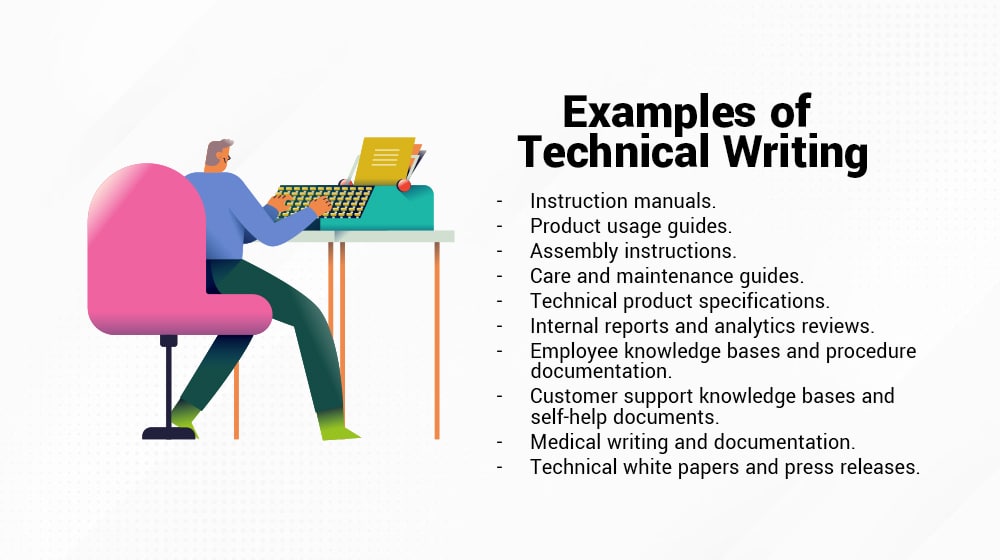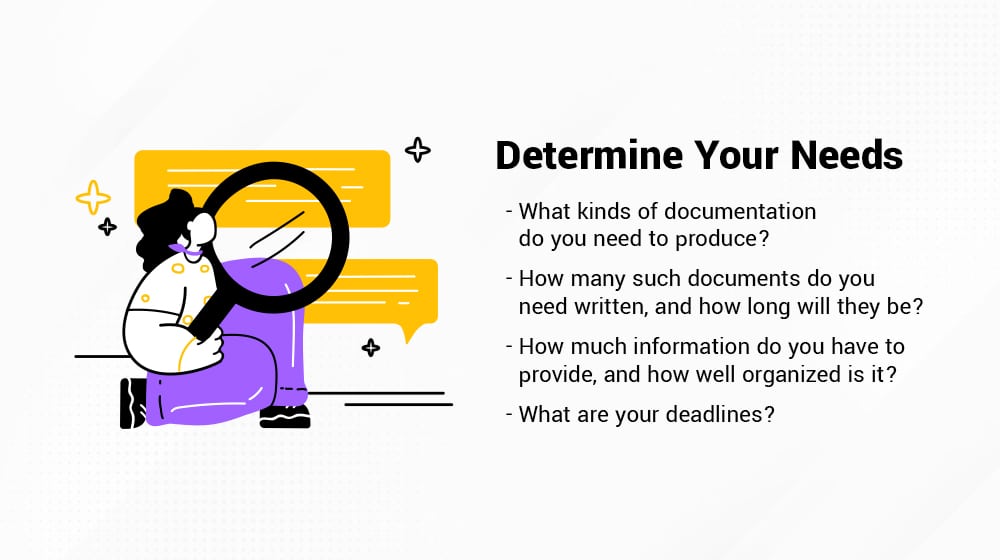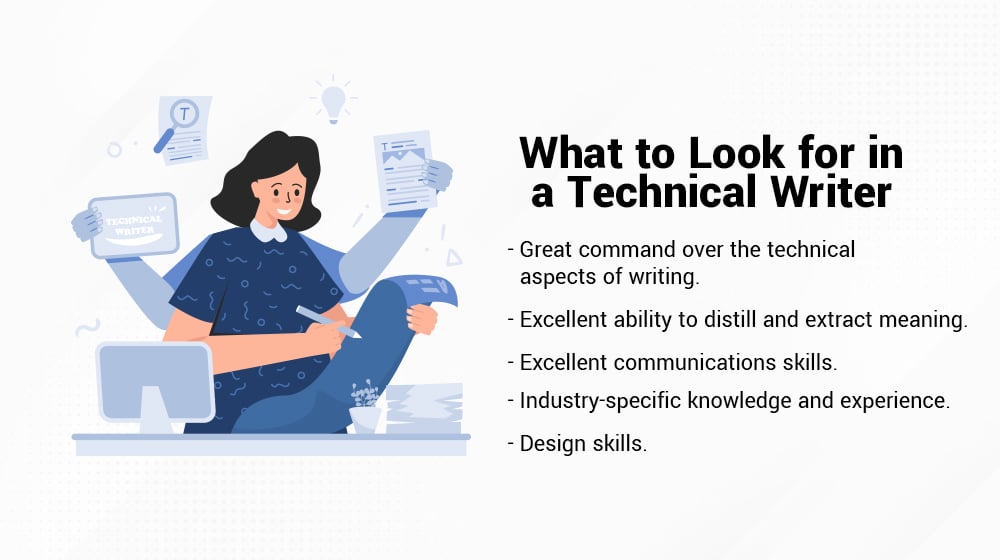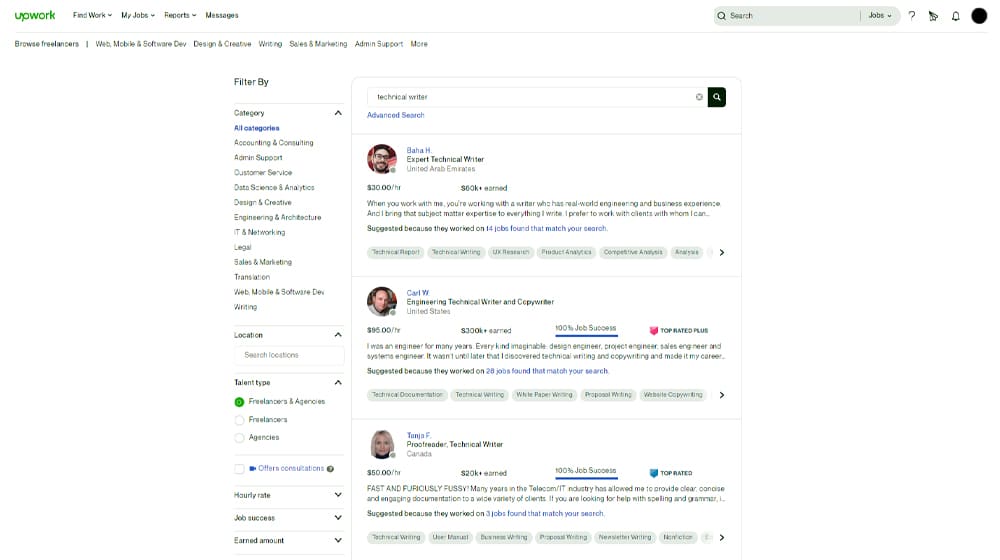Technical writing is a very specific kind of writing, and it's not something the average writer from a content mill can pull off successfully. If you're in the market for a technical writer, you need to know what you're getting into and how to find the right kind of writer. Here's how.
The first thing you need to do is know what technical writing actually is and determine whether or not you actually need a technical writer. Many people simply assume that a technical writer is any writer who can handle technical subjects, but that's not true.
Technical writers create documentation. You are exposed to technical writing every day, even if you don't realize it. It can take the form of both internal business documentation and external customer support documents.

For example:
Even documents like EULAs and ToS pages are technical writing, though those are more often drafted by lawyers because of the legal requirements inherent in their language.
If you want a bunch of real-life examples of technical writing in action, this post has twenty examples of how technical writing is used in the world today.
So, if you're a company offering scientific vacuum equipment or electron microscopes, just because the topic is technical doesn't mean you need a technical writer. But, if you need to produce a care and maintenance guide or an instruction booklet for those pieces of equipment, a technical writer is the way to go.
So, do you need a technical writer? If so, read on. If not, check out this page and see about hiring someone more appropriate for your needs.
Before you can hire someone to do some writing for you, you need to know what kind of project they'll be working on and what you need out of them.
This is important because different writers can specialize in different kinds of technical writing. Some are good at step-by-step instructive content, while others are better at more comprehensive documentation that doesn't need the same level of logical flow.

You'll mostly want to know the answers to questions like:
This all helps you set expectations, both for yourself and for your writers.
In a moment, I'll get to where you can find technical writers. First, though, you should have some idea of what you want to look for in a potential technical writer you hire. You can also check out a more detailed guide on this subject here.

1. Great command over the technical aspects of writing. This might sound obvious, but there are a surprising number of people out there billing themselves as technical writers who can barely write. Of course, they still work because the competition is just as likely to be using Google-translated Chinese instructions that barely convey meaning in the first place, but that's still a bare minimum.
Take a look at the portfolio your prospective writer offers. How consistent are they with tone, language, conventions, and specifications? Are they very specific with information, like measurements? Remember, technical documentation typically needs to be very accurate because people are relying on it to tell them what to do.
2. Excellent ability to distill and extract meaning. While this is one you really need to give the writer a test to fully evaluate, you want a technical writer who can take raw materials and information (from you, from existing documentation, from their own usage, from interviews with engineers, etc.) and convert that information into documentation. Most good technical writers should be able to do this as second nature since it's the core of the job,
3. Excellent communication skills. Technical writers, more so than almost any other kind of writer, need to be able to communicate effectively. Their job will likely involve a lot of back-and-forth with individuals in your company, including developers, engineers, product designers, and others who have the knowledge they need to put into their documentation.
The key skill here is the ability to discern and ask the right questions. They need to be specific, accurate, and knowledgeable in a way that facilitates their ability to get the answers they need. While you can work with technical writers who don't meet that standard, it will be a much harder, more frustrating, and more drawn-out process.
4. Industry-specific knowledge and experience. While a good technical writer can take your information, absorb what they need to know, and format it into technical documentation, it really helps if they're at least somewhat experienced with your area and niche ahead of time.
This is actually why many companies don't use technical writers; they tell their engineers to create documentation. Of course, engineers aren't writers and won't necessarily know how to format and convey information the right way for the audience you need to reach, so it's not a winning strategy.
You don't need to find a technical writer with a PhD in your subject, but finding one who has worked in your industry (in any role; familiarity is the important part) or one who has written documentation for other companies or products in that industry is best.
5. Design skills. This isn't required, but it can be helpful, depending on the job you need to be done. Instruction manuals, assembly instructions, and other documentation often needs images and diagrams to fully convey information. That can mean your documentation needs design elements. If your technical writer is also capable of creating or adapting and using those elements, it's a better, faster, and more effective way of producing a finished product than having to go back and forth with a graphic designer and a writer.
Now, where should you go to find a technical writer?
As with most kinds of writing, you have two primary options. You can find writers where they hang out and pitch them, or you can post a job opening on sites writers are likely to frequent and solicit applications.
If you want to put out a job posting, you can follow a traditional hiring process. Post on your careers page, create a job listing and post it to sites that are likely to have technical writers looking for work. Those sites can include general sites like LinkedIn, Indeed, and FlexJobs, but they can also include writer-specific job boards like mine, ProBlogger, or any of the alternative job boards.
From there, you need to wait for technical writers to apply with a portfolio, resume, and whatever else you ask for. Evaluate your potential writers according to the requirements above, and offer them a test. I'll go into a technical writing test in a moment.
On the other hand, what if you want to reach out to writers individually? You have choices here as well.

On one hand, you can check out the various freelance boards. Sites like Upwork, Freelancer, and Guru allow freelancers to post portfolios and clients (that's you) to pitch projects. You'll need to identify writers whose profiles and portfolios meet your needs, pitch them with your project, and hope they're interested enough to accept.
You can also look for writers in less conventional locations. For example, there's a Technical Writing subreddit, there are plenty of LinkedIn and Facebook groups, and other social groups where you may be able to find technical writers to approach as well. You can also simply search for technical writers who have their own websites, though these tend to be less common than their peers in marketing and copywriting.
If you find a promising writer and pitch your project, and they're interested, you'll want to give them a test just like if they had come to you. The test is an important part of determining whether or not you can work with the writer, after all.
A writing test should be as close to the real thing as possible. In fact, if you can give them a real project, it's a great test! Obviously, this is much harder to do if you're only hiring for a single large project. You may need to break it down and work with them on a single deliverable instead.
Alternatively, you can mock up a fake example using documentation similar to what they would be working with, with similar deliverables. This is a little less helpful because, since you're making it all up, you then have to judge it based on a made-up reality, which can be tricky if you've chosen something weird or exotic.

You also want to pay for your tests. This way, you aren't wasting the writer's time if they don't meet your needs, and if you do end up using the work they produce, you've paid for it. Since unpaid tests are one of the most common writing scams out there, many of the best writers won't even consider working with you if you ask for it.
In general, your writing test should be aimed at seeing how well a technical writer can convert a pile of assorted information into a useful piece of documentation according to your needs. They may also even be able to recommend improvements to your existing documentation!
Finally, once you've found a writer you can work with, you want to lock them in. That means a contract.
You also have a choice to make here. You can hire a technical writer as a freelancer, paying them per word, per project, per page, or whatever rate you agree upon. You might even pay per hour for this kind of writing since a large part of the work is reading, absorbing, and learning the subject before producing documentation. It all depends on the writer, really.
Technical writers aren't generally ghostwriters simply because most technical writing isn't concerned with bylines or author credits. No one really cares who wrote the assembly instructions for their dresser, right?

Thus, the other option is to hire them as employees. This has all of the usual pros and cons of hiring an employee, like hourly or salaried payments, potential benefits, and so on. It's really up to you which you want. With the increasing prevalence of remote work, the lines are starting to blur either way.
Once you've presented a contract and gotten it signed, you can get to work. Ideally, a good technical writer will work with you whenever you need new documentation; their familiarity with your business, products, and needs will facilitate future projects and allow you to skip the tedious hiring process every time.
If you have any further questions about hiring a technical writer, or about hiring writers in general, feel free to reach out and ask! I'm always interested in helping companies and writers get together, and I would be more than happy to assist you however I can! Good luck!